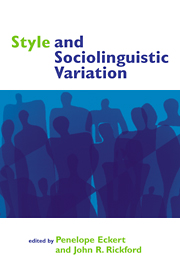Book contents
- Frontmatter
- Contents
- List of figures
- List of tables
- List of contributors
- Acknowledgments
- Introduction: John R. Rickford and Penelope Eckert
- Part I Anthropological approaches
- Part 2 Attention paid to speech
- 5 The anatomy of style-shifting
- 6 A dissection of style-shifting
- 7 Style and social meaning
- 8 Zeroing in on multifunctionality and style
- Part 3 Audience design and self-identification
- Part 4 Functionally motivated situational variation
- References
- Index
7 - Style and social meaning
Published online by Cambridge University Press: 07 December 2009
- Frontmatter
- Contents
- List of figures
- List of tables
- List of contributors
- Acknowledgments
- Introduction: John R. Rickford and Penelope Eckert
- Part I Anthropological approaches
- Part 2 Attention paid to speech
- 5 The anatomy of style-shifting
- 6 A dissection of style-shifting
- 7 Style and social meaning
- 8 Zeroing in on multifunctionality and style
- Part 3 Audience design and self-identification
- Part 4 Functionally motivated situational variation
- References
- Index
Summary
Unlike the other papers in this volume, Labov's is not directly concerned with defining style, but with using style to control and identify intraspeaker variation. He does this, in his own words, as a means of “organizing and using the intra-speaker variation that occurs in the interview.” Taking the analysis of variation as his point of departure, Labov's mission is primarily methodological: to operationalize style so as to elicit and extract chunks of speech in interviews that will show maximal and predictable intra-speaker differentiation in the patterning of variables.
Central to Labov's analytic practice is the sociolinguistic interview as a constructed speech event. The intention is, first of all, to maximize comparability of speech samples for multiple speakers. And within the interview, the intention is to elicit a predictable range of stylistic output from the interviewee, so that the analyst can systematically assign that output to stylistic categories. If the sociolinguistic interview constitutes the discourse universe within which Labov is operating, its validity as a methodological tool depends on the relation between the genres within the interview and similar genres in everyday linguistic practice. One could say, then, that the main connection between Labov's paper and the other papers in this volume is in the comparison between the constructed stylistic world of the interview and the larger stylistic world within which it is embedded and on which it draws.
If we approach variation in the traditional way, as a one-dimensional axis between standard and vernacular extremes, we might see Labov's enterprise in this paper as a search for things that elicit the standard on the one hand, and things that elicit the vernacular on the other.
- Type
- Chapter
- Information
- Style and Sociolinguistic Variation , pp. 119 - 126Publisher: Cambridge University PressPrint publication year: 2002
- 21
- Cited by

